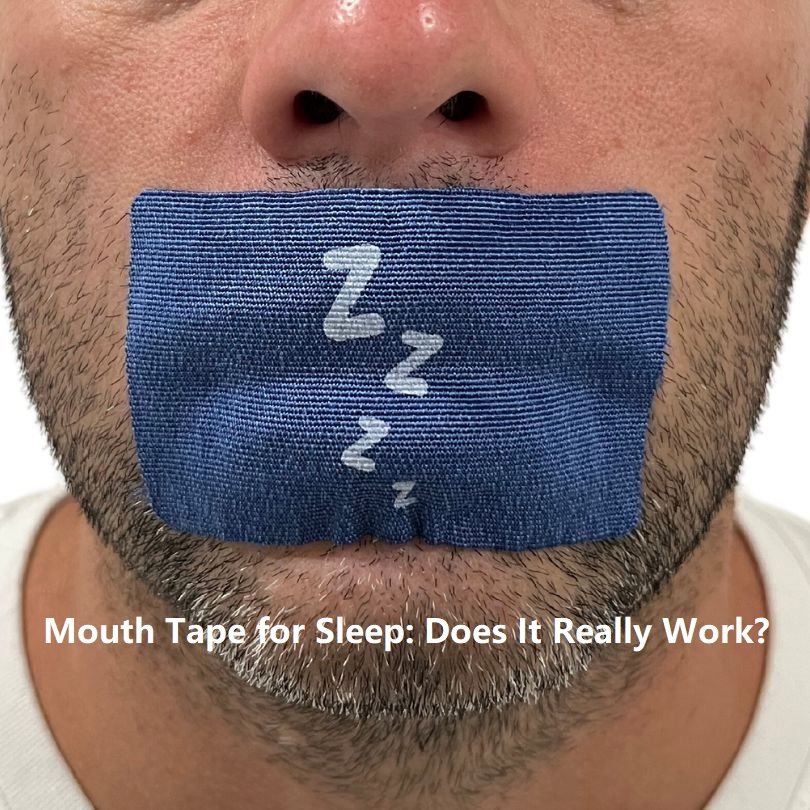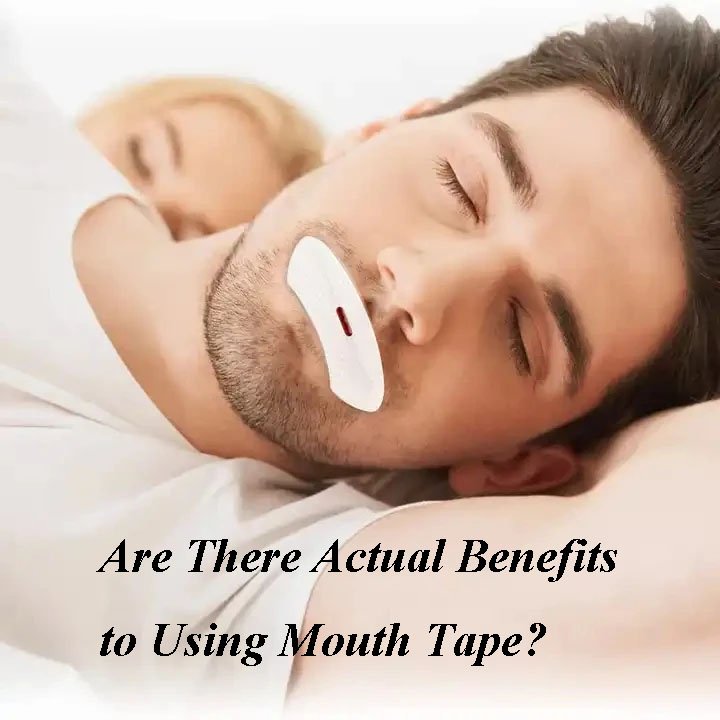Mouth taping is becoming an increasingly popular method for addressing common sleep issues like snoring, dry mouth, and even teeth grinding. By promoting nasal breathing, mouth tape helps improve sleep quality and overall health in a simple, drug-free way. In this article, we explore what mouth tape is, its potential benefits, and whether it can be an effective solution for teeth grinding.
What is a Mouth Tape?
Mouth tape is a simple, yet surprisingly effective adhesive strip that you place across your lips before going to sleep. Its primary use? To encourage nasal breathing and gently keep your mouth closed during the night. You might have heard about it from that health-obsessed friend or maybe from a wellness podcast, but let me tell you—mouth tape has been making quite a buzz lately, and it’s for all the right reasons. Now I’ll explain why.
The idea of mouth taping might sound a little unusual at first. But think about it—our bodies are designed to breathe primarily through our noses. When we breathe through our mouth, especially while sleeping, it can lead to a whole host of issues, from snoring to dryness to, yes, even teeth grinding (more on that later!). Mouth tape steps in to gently help us get back to what is natural. It helps retrain the body to close the lips and let the nose do the hard work, where all that filtering and humidifying magic happens.
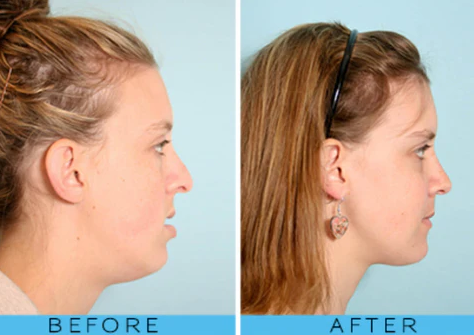
But why is mouth tape getting so popular lately? It’s because people are genuinely tired of waking up with dry mouths, dealing with restless nights, and feeling groggy. By switching to nasal breathing with a little help from mouth tape, many people are experiencing better sleep, improved overall health, and reduced issues like teeth grinding. In fact, according to a recent wellness survey, over 55% of people who used mouth tape reported improvements in sleep quality, which is a solid testament to its growing reputation.
The Potential Benefits of Mouth Tape?
Mouth tape isn’t just a quirky sleep accessory; it has some real, science-backed benefits that make it worth considering. By encouraging nasal breathing, mouth tape can help in a number of ways:
- Improved Sleep Quality
- Reduced Snoring
- Decreased Risk of Dry Mouth
- Lower Risk of Teeth Grinding
- Better Oral Health
- Enhanced Oxygen Uptake
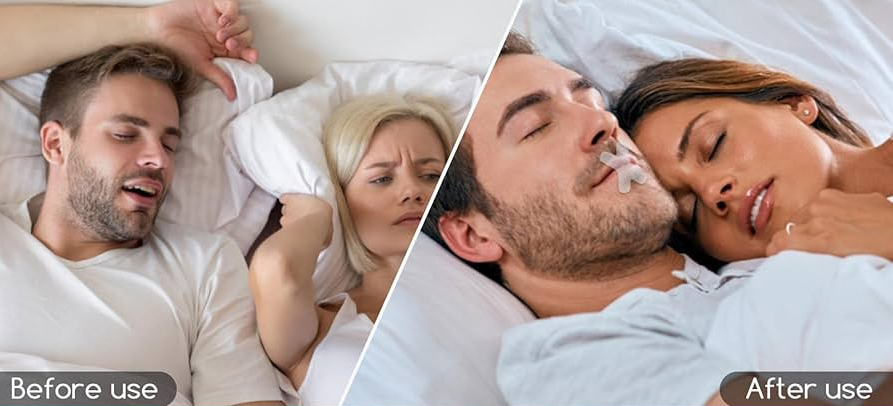
These benefits highlight why mouth tape is more than just a fad—it’s a practical tool for improving sleep and overall well-being.
To learn more about benefits of mouth taping, please read a relevant blog: Actual Benefits of Using Mouth Tape.
How Does Teeth Grinding Happen?
Teeth grinding, or bruxism, is a common condition that affects both children and adults. It typically happens during sleep, which means many people aren’t even aware they’re doing it. So, what’s the root cause of teeth grinding? Well, like many things in the body, it’s not always straightforward. It often comes down to a mix of physical, psychological, and lifestyle factors.
From a professional standpoint, stress and anxiety are major contributors. When we’re feeling tense, our bodies tend to clench, and that includes the jaw muscles. According to Dr. Joseph Thompson, an oral surgeon, stress-induced bruxism is one of the leading causes of teeth grinding in adults. But there’s more to it—misalignment of teeth (malocclusion) can also lead to grinding. When the teeth don’t line up properly, the jaw struggles to find a comfortable resting position, leading to clenching and grinding during sleep.
Other possible causes include sleep disorders like sleep apnea, where disrupted breathing patterns lead to stress on the body, resulting in teeth grinding as a response. And let’s not forget lifestyle factors: caffeine and alcohol consumption are known to increase the likelihood of grinding, as they affect the quality of sleep and can overstimulate the nervous system. About 20-30% of people who grind their teeth do so because of these external factors, according to recent dental studies.

Understanding why teeth grinding happens is crucial in figuring out how to manage it effectively, and mouth tape might just play a surprising role in reducing this behavior by promoting nasal breathing and reducing nighttime stress on the jaw.
Does Mouth Tape Work for Teeth Grinding?
Now, let’s address the big question: can mouth tape actually help with teeth grinding? The answer is yes—mouth tape can be an effective tool for managing bruxism, especially when the grinding is linked to mouth breathing. By encouraging nasal breathing, mouth tape helps reduce the stress on your jaw muscles that comes from breathing through your mouth. This change can lead to a significant decrease in nighttime grinding.
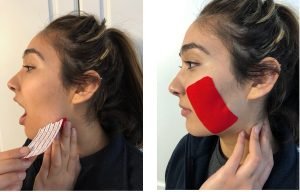
According to Dr. Emily Rogers, a sleep specialist, switching to nasal breathing can help lower the tension in the jaw during sleep, which is a major contributing factor to bruxism. Mouth taping essentially trains the body to maintain nasal breathing throughout the night, thereby keeping the jaw relaxed. This process not only minimizes the likelihood of grinding but also improves the overall quality of sleep.
Moreover, a study published in the Journal of Dental Sleep Medicine found that individuals who transitioned to nasal breathing using mouth tape saw a reduction in teeth grinding episodes by up to 40%. It’s important to note that while mouth tape isn’t a standalone cure for severe bruxism, it can be a valuable part of a holistic approach that includes stress management, proper sleep hygiene, and, in some cases, dental devices.
Conclusion
Mouth tape is a simple yet powerful tool that can help with a range of nighttime issues, including teeth grinding. By encouraging nasal breathing, it promotes better sleep, reduces snoring, and can even lower the risk of bruxism. While it might not be the complete solution for everyone, it’s certainly worth trying as part of a broader strategy to improve your sleep and oral health.
Fonitaniya™ offers a variety of mouth tapes designed for different needs, with over 14 years of experience providing adhesive solutions. Whether you’re dealing with teeth grinding, snoring, or just want a better night’s sleep, mouth tape might be the answer you’ve been searching for.
Experts’ Design
Advanced Material
Get your favorite mouth tape from Fonitaniya™
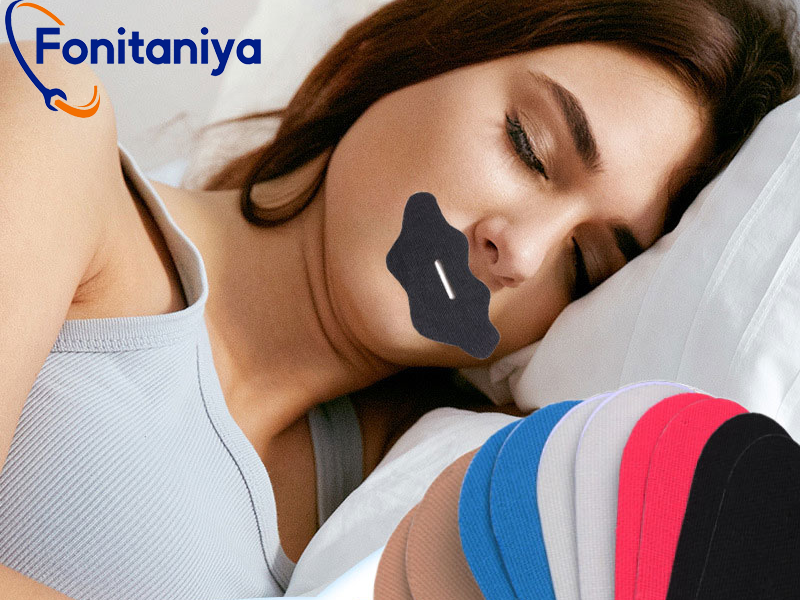
More FAQs About Mouth Tape
How do you use mouth tape safely?
To use mouth tape, make sure your lips are clean and dry. Choose a tape that is hypoallergenic and designed for skin use. Apply it horizontally across your lips, ensuring it is secure but not too tight. In the morning, remove it gently to avoid irritation.
Can mouth tape help with snoring?
Yes, mouth tape can help reduce snoring by encouraging nasal breathing. Mouth breathing is often the cause of snoring. By keeping the mouth closed, the airflow becomes more stable, which can significantly reduce snoring.
Is mouth tape safe for everyone?
Mouth tape is generally safe for most people. However, those with severe nasal congestion or respiratory conditions should consult a healthcare professional before trying it. It’s essential to ensure you can breathe comfortably through your nose before using it.
Can mouth tape really help with teeth grinding?
Mouth tape may help reduce teeth grinding if the grinding is related to mouth breathing. By encouraging nasal breathing, it helps relax the jaw and reduces stress that may lead to grinding.
How long does it take to see results from using mouth tape?
Many people notice improvements in their sleep quality within the first few days of using mouth tape. Consistent use is key. For issues like snoring or teeth grinding, it may take a couple of weeks to see significant results.
What kind of tape should I use for mouth taping?
Use a specially designed mouth tape that is hypoallergenic and gentle on the skin, like those offered by Fonitaniya™. Regular adhesive tapes are not recommended as they can cause irritation and may not be safe for use on the skin.

